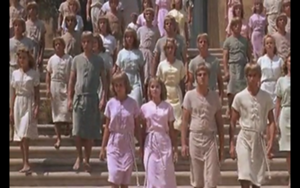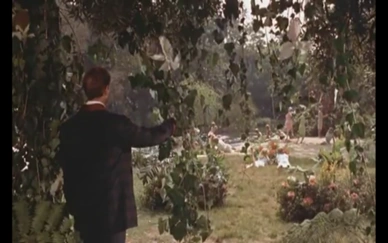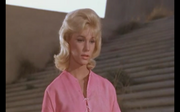| Eloi | |||
|---|---|---|---|

| |||
| Naming | |||
| Binomen | N/A | ||
| Morphology | |||
| Body type | Humanoid | ||
| Intelligence | |||
| Sentience | Sentient | ||
| Sapience | Sapient | ||
| Aggressivity | Low | ||
| Ecology | |||
| Habitat | Urban | ||
| Locomotion | Bipedal | ||
| Behind the Scenes | |||
| Universe | The Time Machine | ||
The Eloi are fictional species depicted in H. G. Wells' much-popularized 1895 novel, The Time Machine. They are the dominant, if not only, humanoid race on the surface of England, and possibly the whole Earth, by the year 802,701 AD. They are the first species the Time Traveler, the protagonist of the novel, interacted with in that century. The Time Traveler theorizes that the Eloi are one of the two descendants of Homo sapien sapiens.
In parts of the novel, the Time Traveler speculates that the human species eventually subdivided into the Eloi and Morlocks due to extreme widening of socio-economic gap. The elite Eloi became intellectual degenerates as the poor Morlocks were literally pushed underground as they were figuratively shoved to the bottom of the socio-economic pyramid.
In the Time Traveler's stay in the 8,028th century, he falls in love with an Eloi named Weena.
Eloi in the 1895 The Time Machine Novel[]
Biology[]
The Eloi are described as child-like. They are around four feet high. Their bodies and heads are bare. They also look quite frail. In terms of sexual distinctions, the Eloi are rendered androgynous. This is probably attributed to their childish physique.
They are all depicted as very beautiful and gracious. They have small ears and mouths. Their eyes contrast these as they were large and mild. Their faces end sharply at the neck and cheek.
Their diet, on the other hand, is only fruits. They have no carnal delicacies and are strictly vegetarians. These fruits are larger and distinct during that century.
Language[]
The Eloi's language is described as "very sweet and liquid." At some point, their conversations are even likened to singing tunes. Though the Time Traveler never gave a sample of the Elois language, he described how distinct it is from his vernacular, English.
Their language is also undeveloped. It is mostly composed of substantives and nouns. Their sentences are short, often composed of at least two words. Their figurative speeches are also lacking.
Societal Structure and Culture[]

The Time Traveler's first look at the Elois in the 1960 The Time Machine Film.
The Eloi society is described as decadent and unprogressive. It has no advanced technology, machines, and even tools. The Eloi, themselves, seem like intellectually degenerated humans. They have short attention spans and lack the curiosity for science. Consequentially, they also do not uphold communitarian values.
The Time Traveler also compares it to a communist society because of its distinct characteristics. The Eloi have no jobs. They are preoccupied with leisure work such as playing, bathing in the river, eating fruit, and sleeping. They all wear similar clothes — "purple tunic, girdled at the waist with a leather belt, sandals or buskins".
Eloi are also polygamous. They do not have one partner emotionally and sexually. They leisurely engage intercourse with any other Eloi. Reproduction is also not valued in their community.
One of the shocking discoveries of the Time Traveler is that the Eloi are actually preyed upon by the underworlder Morlocks. They are also probably those who provide the Elois with their clothes.
Elois in Film and Television Adaptations[]

Yvette Mimieux playing as Weena in the 1960 The Time Machine film.
The Eloi have been featured in at least two feature films — The Time Machine (1960 and 2002) — and two television series. The original 1960 Time Machine film is directed and produced by George Pal. It is starred by actor Rod Taylor as the Time Traveller.
The Eloi are depicted as physiologically similar to humans. They are average in height with similar human facial features. They are all very beautiful and attractive. In the 1960 movie though, the Eloi speak English. They speak very slowly though as if it were not their vernacular. In this film, actress Yvette Mimieux portrayed Weena.
